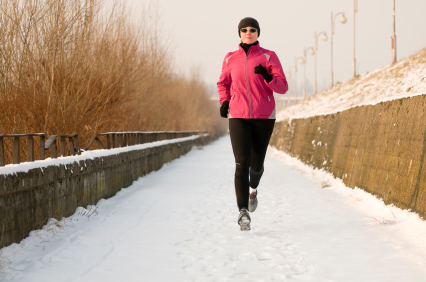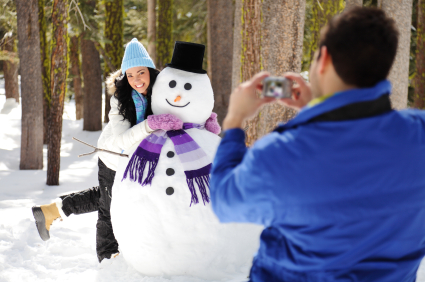Exercising Outdoors in the Winter
Winter weather can deter even the most dedicated exercisers. Less daylight, colder temperatures, and the temptation to curl up under warm blankets makes keeping up with your exercise routine exponentially more difficult. However, just because the temperature outside has dropped doesn't mean you have to drop your outdoor exercise regimen. There are some simple ways to burn calories outdoors even while the weather is frightful. To be successful, you'll want to make outdoor exercise as easy and fun as possible.
Stay Safe Out ThereTake note of the weather conditions and wind chill factor before you plan your outdoor activities, and dress appropriately for the weather. Your best bet is to dress in layers--this allows you to remove outerwear as you get warm and start to sweat and then put them back on as you get cold.

Be sure to protect your hands, feet, and ears from the elements. When it gets cold outside, your body's blood flow concentrates in your core, and this increases the risk of your getting frostbite on these areas. Wear thick gloves and socks as well as earmuffs or a hat or headband that covers your ears.
If you plan to exercise outside in the dark, you need to dress in reflective clothing. To prevent falls on the ice and snow, opt for shoes with plenty of traction.
Additionally, take care to stay adequately hydrated. You may not feel as though you need to drink as much as you would during the hot summer months, but you'll likely still be sweating and will need to replenish the fluids lost through perspiration and breathing. If your exercise will last only an hour or less, water should be your first choice. If you're going to be doing vigorous exercise that lasts longer than an hour, choose beverages with electrolytes, such as sports drinks.
Extend Your Warm-Up ExercisesWhen the weather turns cold, your body gets cold, too. You will need more time to warm up your tight muscles and get the blood flowing to prevent injuries. You can even do your warm-up exercises indoors and then head outside for the remainder of your workout.
Outdoor ExercisesAside from the usual outdoor exercises such as walking, running, hiking, etc., there are other winter-specific ways to incinerate calories. Shoveling snow is an excellent total body workout, and it takes care of all that snow that's been piling up in your driveway and on the sidewalk! Be sure to take frequent breaks, however, because the strenuous exercise can raise your heart rate so quickly that it increases risk of cardiac arrest.

If you have children, grandchildren, nieces, or nephews, playing with them in the snow is a fun way to squeeze in some physical activity while also enjoying the company of your loved ones. Build snowmen or snow caves, have snowball fights, go sledding (or snowboarding if the kids are a little older), make snow angels--just get creative out there! You'll likely have so much fun that you'll forget how chilly it is outside.
Skiing and snowboarding are a couple of outdoor exercises that you could try. Of course, these require that you live in or visit an area that is conducive to these types of exercise. Even if you are a beginner, most places have instructors that can assist you, and there are usually specific areas where beginners can safely practice their new sport.
Now get outside and torch some calories!Kari Hartel, RD, LD is a Registered Dietitian and freelance writer based out of St. Louis, MO. Kari is passionate about nutrition education and the prevention of chronic disease through a healthy diet and active lifestyle. Kari holds a Bachelor of Science in Dietetics from Southeast Missouri State University and is committed to helping people lead healthy lives. She completed a yearlong dietetic internship at OSF St. Francis Medical Center in Peoria, IL, where she worked with a multitude of clients and patients with complicated diagnoses. She planned, marketed, and implemented nutrition education programs and cooking demonstrations for the general public as well as for special populations, including patients with cancer, heart disease, diabetes, Alzheimer's disease, obesity, and school-aged children. Contact Kari at [email protected].
-
Although Big Breakfast Help Women in Weight Loss Yet Return To Obesity
-
Natural Ways to Speed Up Your Metabolism
For many decades everyone knew that the only way to lose weight is
-
Nuratrim Review – Effective Ways To Shed Excess Body Weight Swiftly With A Natural And Clinically Proven Fat Burning Pill And Appetite Suppressant
It is not easy to lose weight. Billions of people are obese throu
-
Things to Consider When Preparing to Lose Weight
When considering a new weight loss progr
-
The Sugarless Candy Weight Management Secret
Most of us have been on a calorie-reduced diet before. For a few d
-
7 Things You Need To Know About Losing Fat
There are a lot of people in this world who are overweight or obese. I
- DON'T MISS
- Free Solar Panels - Nothing Is Free
- Risk of Death Within 30 Days After Bariatric Surgery
- Slim Hips And Thighs Tips To Lose Weight From Hips And Thighs
- Three Easy Ways To Prevent And Suppress Cravings On A Low Carb Diet
- 3 Steps To Leaving Your Comfort Zone Behind
- Avoid These Mistakes In Weight Loss
- Your Dream Body Now, With These Tips
- Diet plan – Eat the correct kinds of foods can support you inside your weight reduction program
- What is the HCG Diet Plan?
- Need an Exercise Buddy? Try Losing Weight With Your Pet!




